Management Systems
How to Create Real Estate CRM Like Monday.com
June 06, 2024 • 264 Views • 16 min read
Tetiana Stoyko
CTO & Co-Founder
Nowadays, finding any platform for real estate agents is very easy. The emergence of various SaaS solutions offers countless software variations for any type of business. For instance, Monday CRM for real estate is one of the leading on the market today. They offer great and efficient services and features, which can significantly improve your real estate business efficiency.
So, why should you build real estate CRM on your own, if there is a lot of fish in the sea? Frankly, there are reasons why the best CRM for real estate developers is the one, created in terms of custom software development. Thus, before we discuss how to build a CRM, we should talk about these “unknown” benefits of creating a Monday.com alternative, instead of using its SaaS.
What is CRM in Real Estate
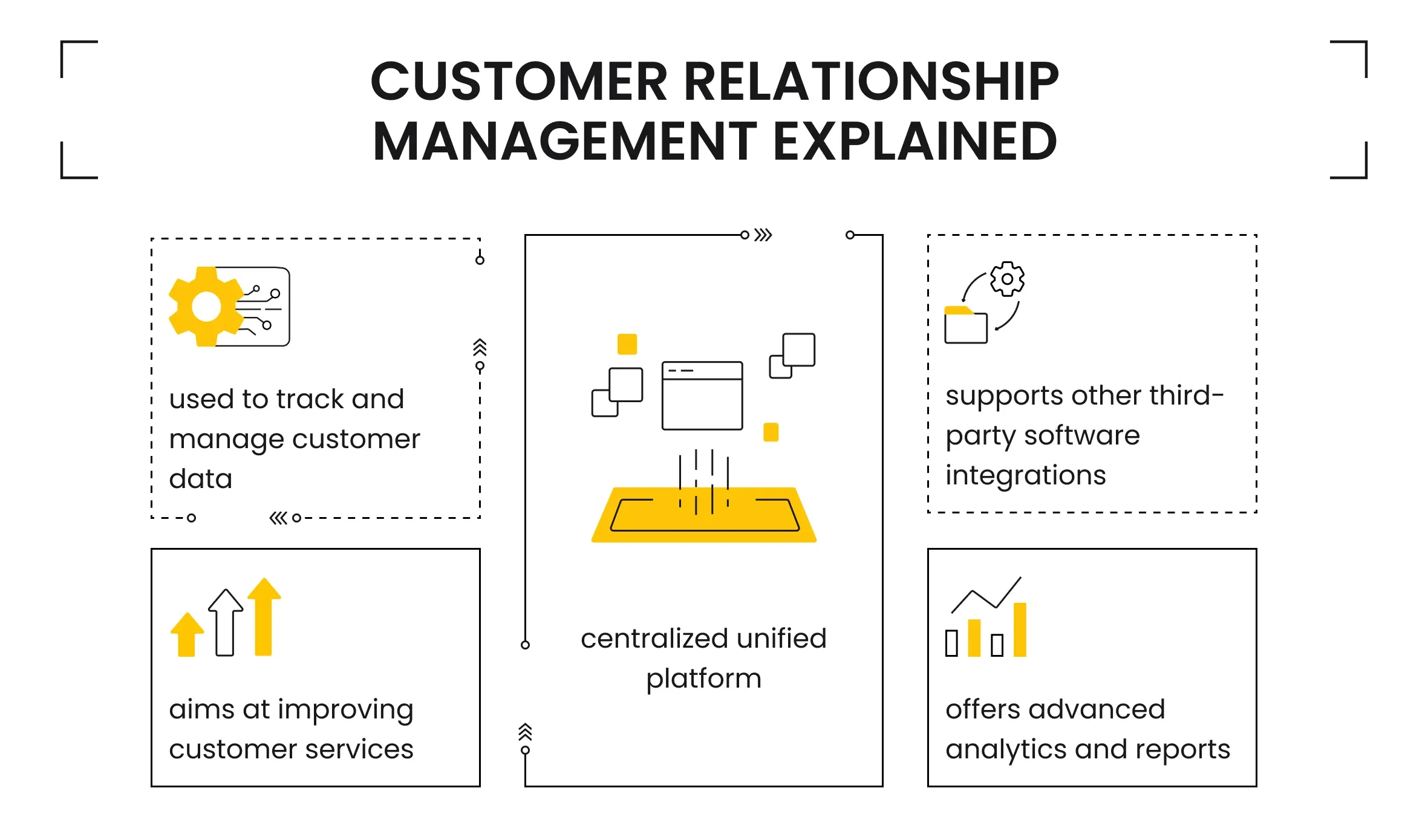
Customer Relationship Management software for real estate, or simply CRM for real estate, is a real estate agent management software, designed to help manage and track information or other data, related to your customer services.
To simplify it, real estate CRM app is a centralized platform, where you can track all interactions with your clients, store, and manage customer data like phone numbers, names, addresses, preferences, etc.
Having such data under hand significantly improves customer satisfaction, allowing your agents to offer more relevant options and personalize customer services.
Yet, these are not the only features, offered by CRM for real estate teams. Frankly, one of the major benefits of developing custom CRM software for real estate brokers is the opportunity to customize it and meet all your requests and expectations.
You can integrate any feature when you build a custom real estate CRM. For instance, one of the most common software-driven features in the best CRM for real estate developers at the moment is process automation. To simplify it, many modern CRM for real estate developers offer the ability to streamline lead management:
Just link your main sources, where you look for potential leads, adjust some settings, and the system will automatically gather all candidates for leads and information about potential clients.
To sum up, don’t underestimate the importance of CRM in real estate. Still, what business benefits can the custom Monday.com alternative bring?
The Business Benefits of CRM in Real Estate
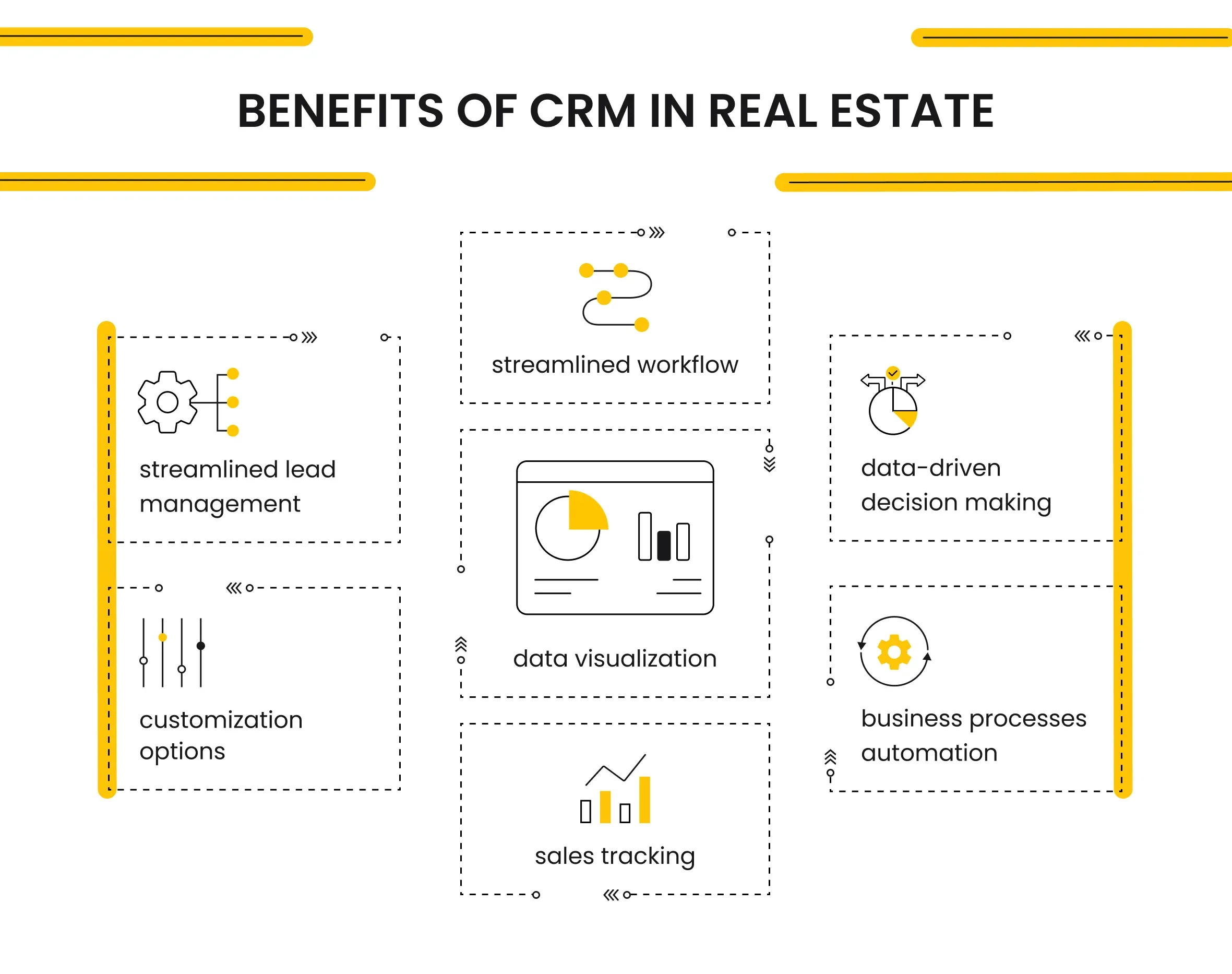
Customization is the core business benefit of any custom customer relationship management software for real estate. To make it simple, any such SaaS solution like Monday CRM for real estate has its limitations.
At first, they might seem uncertain or minor. However, when your business scales or you redesign your business strategy and metrics - you will face their significance, but it will be too late.
When you choose an off-the-shelf software solution like Monday.com or Zoho CRM for real estate, your software providers have full control over the app, not you. So, after noticeable changes in your business processes, you will also require software adjustments.
Yet, in such a scenario, you will get two options:
- Find and upgrade your package, which includes the required features but costs more.
- Look for other third-party software for real estate business, which can cover the functionality lack.
Either way, your real estate business will deal with the unwanted software, most of which will be paid for, yet never used. Besides, remember that some third parties might also not support the integration and cooperation with other services, you use. However, when you build real estate CRM on your own, you can limit the number of features to only needed, and enable support of other software you use.
Nevertheless, almost all software solutions have the same list of general benefits of CRM in real estate.
Streamlined Lead Management
Once again, each modern real estate management CRM offers options to improve and streamline lead management.
To cut a long story short, this feature allows you to define main lead sources such as:
- Your real estate business website
- Social Medias
- Email campaigns
- Personal communication
- Other engagement ways and sources
Thanks to software-driven algorithms, all this information is tracked and stored in a centralized and standardized way. So, your employees and real estate agents can easily navigate the client database and find the required information for further processing.
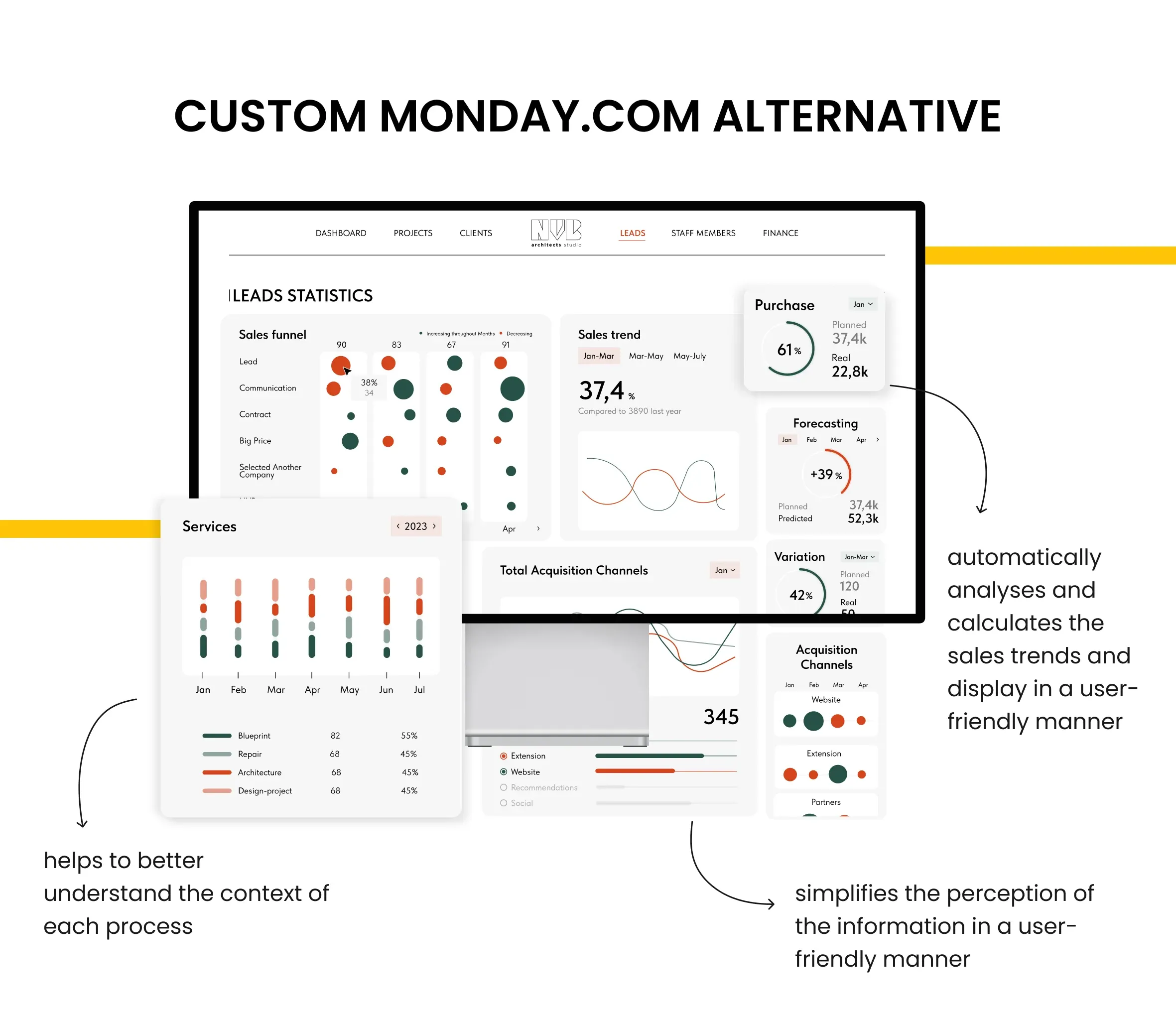
Having predefined standards for storing and sorting such data is also crucial for analysis: it helps to simplify the analysis of success rate and identify main lead sources. Also, this helps to understand what is great, and what can be improved or changed.
For instance, if your email campaign shows poor results, while social media advertisement is better than usual: you can perform an in-depth study of working processes in both cases and pinpoint the reasons for failure and success.
Sales Tracking
Sales tracking is among other beneficial real estate CRM features.
To simplify it, your custom real estate CRM can track and analyze the entire sales cycle. As a result, your business managers and sales team will be able to define main trends, potential pitfalls and bottlenecks, and learn more about their performance and success rate.
Additionally, statistics and sales history are not the only potential benefits for your real estate business. For example, building custom real estate CRM allows you to consider integrating sales forecasting AI solutions. As a result, apart from having accurate statistics on the finished sales cycle, you can also predict future revenue or what else to expect from the next cycle.
Streamlined Workflow
CRM systems for real estate agents are used to automate repetitive business tasks and processes.
Any business deals with repetitive and routine tasks. Many processes under the hood must be performed in a certain pattern. Fortunately, real estate CRM integration can help, and free some resources by setting a streamlined workflow.
Not everything can be automated. Still, why won’t you use the possibility to streamline what can be automated? This can both cut some expenses and boost the performance of the team. To add more, Correctly built streamlined workflows are resistant to human factors and mistakes.
Dashboard Data Visualization
CRM for realtors can also provide your real estate business with data visualization tools like Dashboards.
Real estate CRM app with built-in dashboard features can significantly improve and simplify management activities. In a nutshell, such functionality transforms various data inputs into user-friendly charts and schemes
Besides, it can automatically calculate different metrics and visualize them, making it an easy CRM for realtors, where they can also see various statistics.
Furthermore, such elements can be combined with the rest features of CRM for property developers like sales tracking, or streamlined lead management and workflow. As a result, making your estate agent CRM software even more efficient and advanced.
Data-Driven Decision Making
Finally, CRM systems for real estate agents are commonly used for accurate and fast data-driven decision-making.
One of the major benefits of CRM in real estate is its advanced algorithms and standardization, related to data processing and storing. Nonetheless, having fast and clear access to required data is just a part of this benefit.
Apart from speeding up customer inventory, this also stimulates decision-making. Many real estate businesses require a fast and scalable customer database, which can include both general information about clients, and some very specific data inputs like tax forms, income verification documents, etc.
Thus, CRM in real estate industry plays a significant role by providing customizable, scalable, efficient, and user-friendly solutions for improved data storage and decision-making.
Building Your Real Estate CRM: Key Features
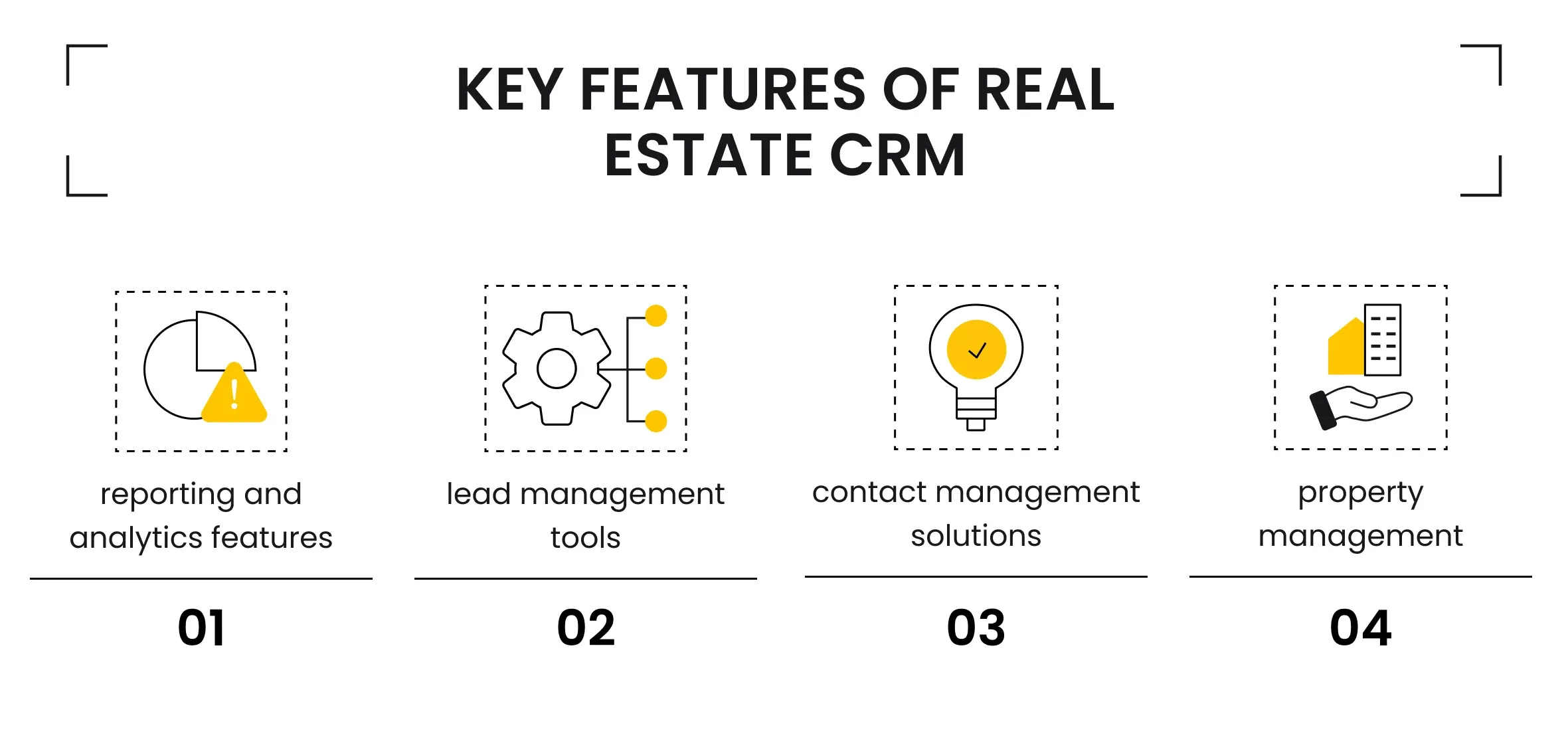
The aforementioned is just a short list of business benefits, brought by real estate CRM integration. Yet, most of them are common and general, offered by any Monday.com alternative.
But what key features are offered by custom real estate CRM development?
Lead Management
Once again, lead management is one of the major features of any real estate CRM solution.
There are two ways to enable lead management in CRM software for real estate industry:
- Manual, by creating standardized templates, stored in the same place, so that agents could manually update each client’s profile.
- Automated or streamlined, when your dedicated development team either integrates third-party solutions for such purposes or creates custom development tools.
On the one hand, manual lead management is much cheaper and faster to develop, yet lacks efficiency in the long run.
Alternatively, building custom development tools like pipelines or even integration of ready-made third-party solutions will take more time and be more expensive, yet also noticeably increase the efficiency of your real estate management CRM.
Contact Management
One of the crucial trends in this industry is real estate CRM with text messaging.
Combined with streamlined lead management and generation solutions, built-in text messaging offers a variety of ways to improve customer satisfaction and client retention.
They are a part of contact management. Apart from the ability to text your clients directly, it also offers options to integrate chatbots or other AI solutions for customer services.
For instance, you can add options for direct communication or FAQs on your social media, or your website.
Finally, Even easy CRM for realtors offers features for improved contact management. Still, it is rather a combination of various systems and solutions, than a single feature. For instance, improved and useful customer data storing brings opportunities for a more personalized and specific approach to each customer, tracking their interests and preferences, etc.
Property Management
Apart from having a database of your customers, each CRM for realtors must also include options for categorizing and updating data on current assets.
To cut a long story short, your real estate business will require features for improved property management. Depending on your business specifics and asset sources, you have to define the preferred instruments and software.
Reporting & Analytics
Eventually, CRM for real estate developers must offer a toolset for automated and advanced reporting and analytics.
Apart from having all the required data at hand, efficient CRM in real estate industry should offer analytics for data-driven decision-making, streamlined sales tracking and prediction, etc.
Raw unprocessed data brings almost no competitive advantage over the rivals. It also doesn’t affect the performance of business processes. So, choosing and embodying best practices and solutions for reporting and analyzing routines is crucial, when you build real estate CRM.
Why Build Your Own Real Estate CRM?
So, when and why do you need to create real estate CRM on your own?
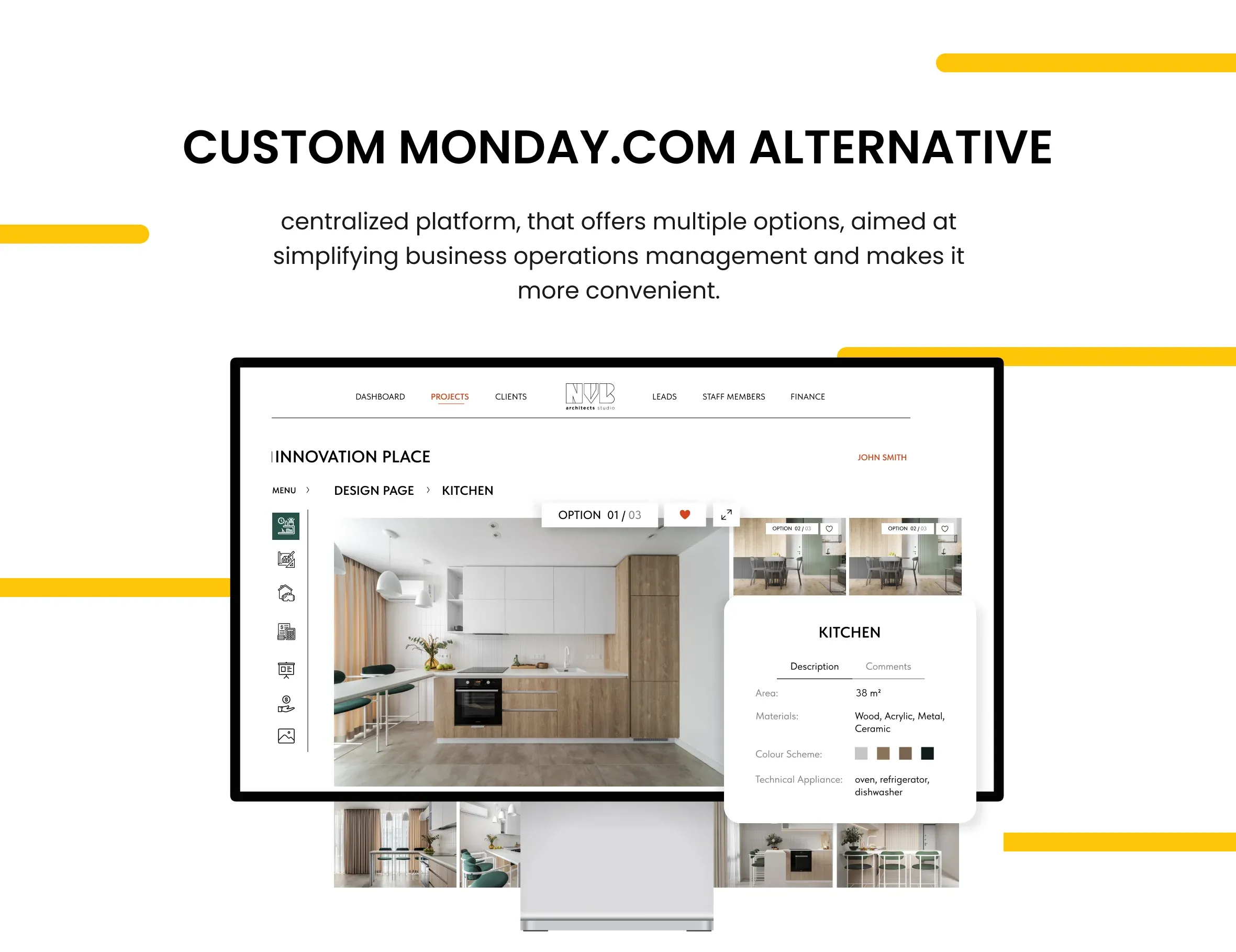
Judging from our experience, despite even the easiest CRM for realtors creation demands much more resources, time, and finding an experienced dedicated software development team, it is still worth it in most cases.
Developing a custom CRM for real estate teams offers your business:
- Full control over the app, so you can integrate any changes in a fast and convenient way
- Personalized management experience, meeting all your requirements and demands
- Advanced and unique toolset, based on your business specifics and preferences
- Cost efficiency in the long run, making it much cheaper and convenient to maintain in terms of scaling, or long-term business perspective
To prove our point, we propose you check some of our recent case studies, where we show our experience in CRM for real estate business creation and other software development projects. Also, you can get acquitted with the feedback of your industry partners.
Besides, you can always write us your idea for further discussion and project estimation.
What’s your impression after reading this?
Love it!
1
Valuable
1
Exciting
1
Unsatisfied
1
FAQ
Let us address your doubts and clarify key points from the article for better understanding.
What does CRM mean in real estate?
In real estate, CRM stands for Customer Relationship Management. It refers to the strategies, practices, and technologies that real estate professionals use to manage and analyze customer interactions and data throughout the customer lifecycle. The goal is to improve business relationships with clients, assist in customer retention, and drive sales growth.
A CRM system in real estate helps agents and agencies manage client information, track leads, monitor ongoing transactions, automate marketing efforts, schedule follow-ups, and provide better customer service. By centralizing all client-related information, a CRM can streamline operations, improve efficiency, and enhance the overall client experience.
How to use CRM for real estate?
To use a CRM in real estate, choose one with essential features like lead management and property tracking. Set it up by importing contacts and customizing fields. Capture and prioritize leads, maintain detailed client profiles, and track all communications.
Manage listings, schedule showings, and automate marketing campaigns. Track transactions, manage documents, and set reminders for key milestones. Use CRM analytics to monitor performance and integrate with other tools you use.
Ensure regular updates, consistent use, and proper training. Collect feedback to improve. This streamlines your business, enhances client relationships, and boosts productivity.
What is a CRM system in real estate?
A CRM system in real estate is a software tool that helps real estate professionals manage their interactions with clients and prospects. It centralizes and organizes client information, tracks leads, schedules follow-ups, manages property listings, and automates marketing efforts. By using a CRM, real estate agents can improve client relationships, streamline their workflow, enhance communication, and ultimately boost sales and client satisfaction.
How much does a real estate CRM cost?
The cost of a real estate CRM can vary depending on factors such as the features included, the number of users, and whether it's a subscription-based service or a one-time purchase.
Basic CRM systems can start at around $20-$50 per user per month, while more comprehensive and feature-rich platforms can range from $50 to $200 or more per user per month. Some CRM providers offer tiered pricing plans with different levels of functionality, allowing users to choose a plan that best fits their needs and budget.
Additionally, there may be setup fees, training costs, and potential additional fees for extra features or integrations. It's essential to consider the overall value and return on investment when evaluating the cost of a real estate CRM for your business.
YOU MAY ALSO LIKE
Let’s talk!
This site uses cookies to improve your user experience. Read our Privacy Policy
Accept
Share this article